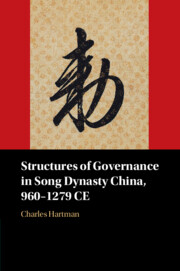Book contents
- Structures of Governance in Song Dynasty China, 960–1279 CE
- Structures of Governance in Song Dynasty China, 960–1279 CE
- Copyright page
- Contents
- Figures
- Tables
- Preface
- Notes on the Cover and on the Text
- Introduction
- Part I Dual Faces of the Song State
- 1 Gentlemen versus Petty Men
- 2 Virtue versus Talent
- 3 Inner versus Outer: The Politics of Political Space
- 4 Collective versus Unilateral Decision Making
- 5 The Technocratic–Confucian Continuum
- Part II The Technocratic and Confucian Models of Governance
- Part III Interactions
- Appendix of Senior Administration Positions, 1162–1182
- Bibliography
- Index
1 - Gentlemen versus Petty Men
from Part I - Dual Faces of the Song State
Published online by Cambridge University Press: 30 March 2023
- Structures of Governance in Song Dynasty China, 960–1279 CE
- Structures of Governance in Song Dynasty China, 960–1279 CE
- Copyright page
- Contents
- Figures
- Tables
- Preface
- Notes on the Cover and on the Text
- Introduction
- Part I Dual Faces of the Song State
- 1 Gentlemen versus Petty Men
- 2 Virtue versus Talent
- 3 Inner versus Outer: The Politics of Political Space
- 4 Collective versus Unilateral Decision Making
- 5 The Technocratic–Confucian Continuum
- Part II The Technocratic and Confucian Models of Governance
- Part III Interactions
- Appendix of Senior Administration Positions, 1162–1182
- Bibliography
- Index
Summary
Chapter 1 examines the bipolarity of junzi 君子 (gentlemen) versus xiaoren 小人 (petty men) as a fundamental contrast of Song political discourse. Many historians of Song understand these terms in their original moral context from the Zhou-era Confucian classics and therefore dismiss this distinction as antiquated philosophical rhetoric. But the eleventh-century Confucian resurgence, led by Fan Zhongyan and Ouyang Xiu, brought these ancient constructs once again to the center of political theory and practice. The chapter explains how the junzi/xiaoren contrast quickly came to define the eleventh-century Confucians’ view of themselves as a self-identifying political group committed to governing through institutionalist principles, and how this junzi/xiaoren dichotomy became the center of a Confucian political rhetoric that defined its opposition as those who did not support this vision. Lastly, the duty of the emperor to govern by distinguishing between junzi and xiaoren among his officials became a fundament tenet of Confucian institutionalism.
Keywords
- Type
- Chapter
- Information
- Publisher: Cambridge University PressPrint publication year: 2023

